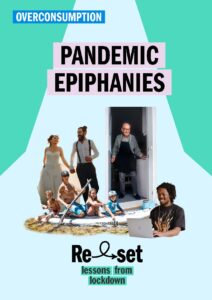Millions locked into the consumer ‘work and spend’ cycle experienced something different during the global pandemic, rethinking what really matters. For many, this meant making time for creativity, activism, community volunteering, spending time with friends and family, and to grow as people.
Covid has jolted the record player of all our lives. The new experiences people have had as a result means that, as the needle returns to the vinyl, we could find ourselves in a different groove.
– Leo Murray, director of innovation at Possible
Demands for better work-life balance, made possible by a shift to a shorter working week, are also on the increase. As a mirror of the rapid transitions needed for the climate and ecological emergency, people themselves have experienced transformations. It could be called the great pandemic epiphany.

This story is part of the Reset series – a collection of short downloadable stories that look in more detail at over consumption and unnecessary travel. They consider some of the key messages and solutions that have become apparent during the pandemic that could help us make the rapid transition to a more sustainable future.
This guide has been made possible by the support of ClimateWorks Foundation.
 Eat, sleep, work, shop. Sometimes in consumer societies it seems there’s not much more to life. In pre-pandemic days, the old economic system wanted people to behave as selfish, competitive individuals. But the pandemic not only brought out the best in many people, with millions making sacrifices to help others and put public safety first, it created an opportunity for many to rethink what mattered in life and seek to escape the ‘work and spend’ consumer trap.
Eat, sleep, work, shop. Sometimes in consumer societies it seems there’s not much more to life. In pre-pandemic days, the old economic system wanted people to behave as selfish, competitive individuals. But the pandemic not only brought out the best in many people, with millions making sacrifices to help others and put public safety first, it created an opportunity for many to rethink what mattered in life and seek to escape the ‘work and spend’ consumer trap.